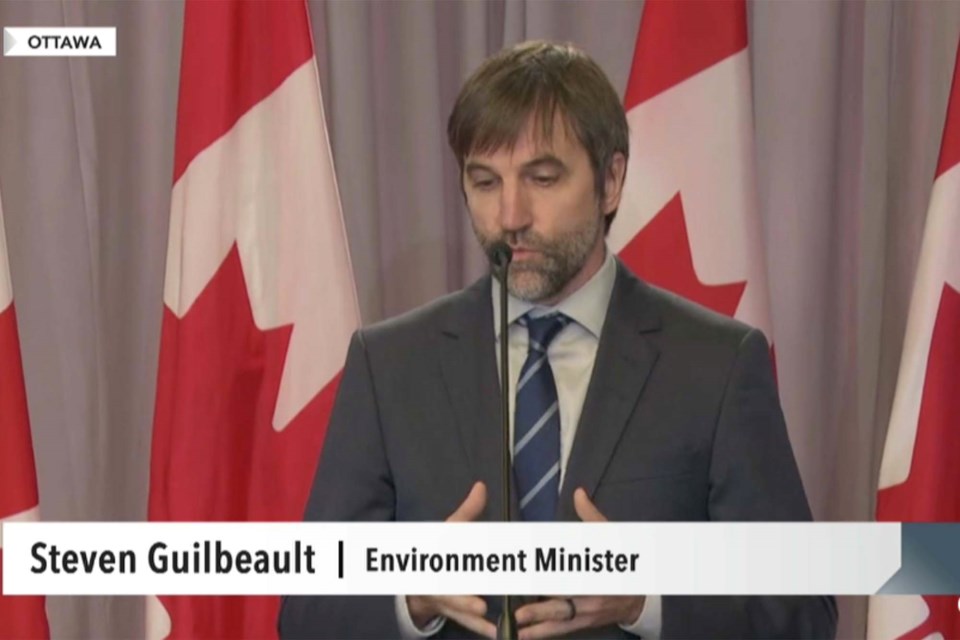It might be safe to say that more than a few Albertan jaws dropped when a former Greenpeace activist was named minister of environment and climate change last week.
On Oct. 26 Prime Minister Just Trudeau announced his new cabinet, which included some notable changes.
Laurier-Sainte-Marie MP Steven Guilbeault was appointed as the new minister of environment and climate change.
Guilbeault, a well-known climate activist, scaled the CN Tower in Toronto in 2001 and hung a banner reading, "Canada and Bush Climate Killers," as reported by the CBC, to call Canada to ratify the Kyoto Protocol.
According to a government biography, Guilbeault co-founded Équiterre, Quebec’s largest environmental organization, in 1993. He has worked as a director at Greenpeace and other organizations specializing in green economies.
It’s tough to say how his appointment will affect an oil-industry-dependent Alberta.
In a press conference, Guilbeault said the federal government has ambitious new commitments in its platform.
“Namely to cap emissions from the oil and gas sector at the current level and then diminishing over time, so that we reach net zero by 2050. And also, to phase out two years before our G20 country partners, fossil-fuel subsidies … We've committed to do that by 2023. We will be continuing and accelerating in the fight against climate change,” Guilbeault said.
Morinville-St. Albert MLA and Associate Minister of Natural Gas and Electricity, Dale Nally, had little to say about his thoughts on Guilbeault and what his appointment could mean for Alberta.
“I hope that Mr. Guilbeault will keep an open mind and be willing to work together with Alberta on practical solutions that do not harm the jobs of thousands of hard-working Albertans,” Nally said in an email.
St. Albert-Edmonton MLA Marie Renaud said she thinks it's important to wait and see what happens, as it has only been a week since Guilbeault was appointed.
“I'm reading from different commentary that this government is taking climate change very seriously. So, it's one thing to say it, it's another thing to appoint someone who's kind of high profile that way,” said Renaud.
As for the plan to reach zero emissions by 2050, Renaud said she is eagerly watching COP26 to see what happens as leaders and ministers, including Guilbeault, discuss the future. She thinks there will be significant climate commitments from around the world.
“I think that Alberta, like the rest of the country, is going to be facing some big decisions and some big changes, and I think we've all known this for a while, and this is very serious … We have hard decisions to make. I'm not entirely sure what those will be yet, but I think that we need to be part of those discussions,” Renaud said.
The previous environment and climate change minister, Jonathan Wilkinson, was moved to natural resources.
Renaud said she heard Wilkinson had a good working relationship with the province, and she is hoping that will continue with him in natural resources.
Nally confirmed that sentiment and said for the past two years he has had a "respectful and constructive working relationship" with Wilkinson.
“We are both in agreement that natural gas has a significant role to play as we work to expand and improve sustainable energy production,” said Nally.
During a press conference, Wilkinson was asked about his position on the future of fossil fuels in the country. He said in his previous portfolio his focus was on "finding pathways to reduce emissions in all economies in a manner that is consistent with the pursuit and achievement of economic opportunity."
"Oil and gas is one of the areas where we clearly need to see significant reductions in the emissions that are associated with that. It's the largest single source of emissions in this country, but there are pathways. There are economic pathways,” said Wilkinson.
Another notable change was the appointment of Edmonton Centre MP Randy Boissonnault to the cabinet. Boissonnault is now the minister of tourism and the associate minister of finance. Boissonnault is the first Albertan to be appointed to cabinet since 2019 — there were no Alberta Liberals elected in 2019.
“It's good to have a voice at the cabinet table from the Capital Region. We haven't in a few years. There are certainly a number of issues that this region in Alberta, in general, needs to bring up. So that's encouraging,” said Renaud.
In keeping with the 2015 precedent, half of the 38 ministers in the new cabinet are women.
“It was great to see some women taking up really significant portfolios, which is encouraging for Canadian women,” said Renaud.




